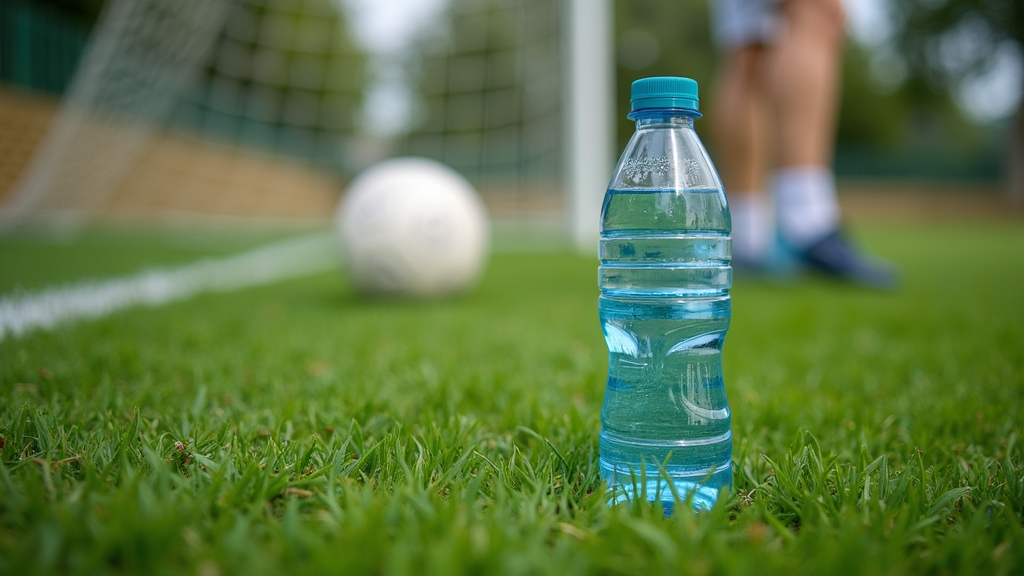Hydration is a game changer in soccer. The sport is fast and physically demanding, with every sprint, pass, and tackle putting your body to the test. While skills, tactics, and stamina are all super important, proper hydration often gets overlooked by players and even some coaches. Yet, it can seriously affect how you move, your focus, and your recovery time. Here’s a closer look at why hydration is a big deal in soccer, with practical tips to stay on top of your game.

Why Hydration Matters for Soccer Players
Playing soccer isn’t just about being fast on your feet or having sharp footwork. Your body depends on water to work smoothly, especially during matches or intense training. When you run around on the field—even for more than 90 minutes—you’re losing sweat pretty quickly, even if you don’t notice it. That fluid loss can make you feel sluggish, slow your reaction times, and even put you at risk for muscle cramps or heat exhaustion.
The amount you sweat depends on things like the weather, how hard you’re playing, and even what you ate that day. According to the National Institutes of Health, dehydration of just 2% of body weight can lower both physical and mental performance. If you want to stay sharp on the field from kickoff to the final whistle, hydrating before, during, and after play is super important.
How Dehydration Impacts Soccer Performance
When you’re dehydrated, your body can’t cool itself efficiently. That puts extra stress on your heart and muscles. Instead of focusing on the game, you may start feeling tired and distracted. Coordination, concentration, and especially sprint speed can take a hit. Here’s what can happen if you don’t drink enough before and during a game:
- Early Fatigue: You’ll feel tired sooner and need more time to recover.
- Cramps and Injuries: Muscles are more likely to seize up or pull when they’re low on fluids.
- Poor Focus: Mental clarity drops, making mistakes with simple passes or losing track of an opponent.
- Decreased Endurance: Running out of energy during a crucial play is way more likely.
A study in the International Journal of Sport Nutrition and Exercise Metabolism found that even light dehydration can mess with muscle strength and decision-making. That means missing out on goals, making bad tackles, or simply being a step behind your mark. Extra caution is needed in hot and humid environments, as the risk of heat-related issues climbs fast, especially for younger athletes.
Hydration also helps your joints stay lubricated, cutting down friction and lowering your risk of strains or injuries. If you’ve ever struggled through a match with heavy, tired legs, dehydration could be a big part of the story.
Check Out : Learn how to do online business
Hydration Essentials for Every Soccer Player
Knowing how to stay hydrated isn’t complicated, but consistency is key. Soccer players need to focus on these basics:
- Drink Before You’re Thirsty: Thirst is a sign you’re already behind. Start hydrating at least a couple of hours before a match or practice. Sipping water gradually works best.
- Keep Drinking During Play: Having quick water breaks, even if just for a sip, helps. Many teams use scheduled breaks to help everyone remember to stay hydrated.
- Refuel After the Game: Replace lost fluids right away to help your body recover and prep for the next session.
As a rule, I like to weigh myself before and after games. Each pound lost means roughly 16 ounces (about half a liter) of water that needs replacing. This simple check gives a good sense of where you stand. You can also check your urine color—a pale yellow means you’re probably on track, while dark yellow suggests it’s time to drink up. Adding some fruit like orange slices as a post-game snack can help recover both water and minerals.
Recognizing Signs of Dehydration on the Field
Sometimes it’s easy to miss when dehydration is starting to set in. Here are a few things I keep watch for on myself and my teammates:
- Dry mouth or chapped lips
- Feeling lightheaded or dizzy
- Muscle cramps
- Headaches
- Reduced sweat, even when playing hard
- Dark yellow urine at halftime or after the match
Spotting these signs early makes it much easier to bounce back just by drinking more water and sometimes taking quick breaks in the shade. Coach and captains should also keep an eye out for anyone who seems out of sorts, especially younger or less experienced players who may not speak up for themselves. Having a “hydration buddy system” can help keep everyone feeling their best.
Tips for Staying Hydrated During Soccer Matches
There’s no universal answer for how much to drink, but some simple habits really help. Here’s how I tackle staying hydrated:
- Start the day right: Drink a full glass of water with breakfast. A light, balanced meal will also help your body hold onto that fluid longer.
- Carry your own water bottle: Markings on the side make it easy to track how much you’re actually drinking.
- Watch the weather: Hot, humid days mean you’ll sweat more, so ramp up your fluid intake.
- Electrolyte drinks count: Sweating a lot or playing back-to-back games? Sports drinks containing sodium and potassium can keep your salt levels balanced.
- Create drink routines: Take quick sips during throw ins, goal kicks, or any downtime. Taking a small drink at each half or during substitutes can reinforce regular hydration.
- Cool off when possible: If you can, take short rests in the shade and splash cool water on your face and neck between halves. Cooling off your core temperature helps further limit fluid loss.
Hydrating isn’t just about last-minute chugs. Making it a habit at team practices goes a long way when it comes to game day.
Common Hydration Mistakes in Soccer (and How to Avoid Them)
I’ve seen plenty of players learn these lessons the hard way. Here are a few common pitfalls and easy ways to dodge them:
- Only drinking when thirsty: Make a habit of regular sips instead.
- Relying solely on water for long sessions: If you’re playing or training for over an hour, especially in the heat, fluids with sodium help replace what’s lost in sweat.
- Guzzling too much at once: Downing a ton of water fast can cause discomfort or even nausea. Spreading out your drinks works better.
- Ignoring signs of dehydration: Listen to your body’s signals. Step off the field if you’re feeling off, rehydrate, and don’t rush back too soon.
- Drinking only at breaks: Sips throughout play are better than just chugging a bottle mid-game.
Adjusting your hydration habits doesn’t require big changes, just awareness and a simple routine. It may seem like a small thing, but the difference it makes in your play and recovery is huge.
Hydration and Recovery
Hydration isn’t just for performance during matches. It’s just as important for muscle recovery. Well hydrated muscles bounce back faster, making you less likely to feel sore the next day. This means you can train harder, more often, and you’ll run into fewer setbacks from cramps or strains. After tough tournament weekends, I’ve found that skipping post-game hydration made recovery much rougher and my legs felt much heavier. Making fluids a priority after matches always pays off in the days that follow. Adding a little salt to snacks or drinks can further restore what’s lost in sweat, especially for players who finish games with salt stains on their uniforms or skin.
Water vs. Sports Drinks
A question I often get: is plain water enough? For most youth and casual players, drinking water before and during the game is usually plenty, especially if your session is under an hour. If you’re in a longer match, training in high temps, or playing back-to-back games, sports drinks with sodium and potassium help replace minerals lost in sweat. Alternatives like coconut water or electrolyte tablets can work for some folks, but always check labels for added sugar or colorings.
Remember, most sports drinks are loaded with sugar or flavoring. Use them mainly during extra hard or long sessions, not as your daily hydration go-to. Overuse can lead to unnecessary calories and dental problems, so water should still be your top choice most days.
Real World Hydration Strategies for Soccer Teams
Making hydration a team focus makes a real difference for everyone’s performance. From what I’ve seen, teams that plan for hydration breaks have fewer cramps, less fatigue, and maintain sharper focus until the last whistle blows.
- Coaches can set up water breaks every 15–20 minutes during practice, whatever the weather.
- Team captains can remind everyone to take a drink before each drill or set play.
- Having a team “hydration challenge” keeps things fun and competitive, motivating players to drink more throughout training and matches.
- Parents can pitch in by bringing extra fluids, fruit, or coolers, giving the squad a boost during long tournaments or hotter months.
Sometimes teams hire sports nutritionists or trainers to create custom hydration plans, but just building group habits works just as well. Shouting reminder cues like “sip up!” or celebrating the most hydrated teammate can quickly make drinking water second nature.
Frequently Asked Questions
Here are some questions I often hear from players, parents, and coaches about hydration in soccer:
Question: How do I know if I’m hydrated before a game?
Answer: Light colored and clear urine is a good sign. If you’re not sure, drink an extra glass or two an hour before hitting the field. Being mindful of headaches or sluggishness is another clue you may need more fluids.
Question: What should I avoid drinking before or during games?
Answer: Skip energy drinks, sodas, and anything with caffeine before games—they can actually dry you out. Stick with water or a low sugar sports drink. Also, drinks with artificial colors or too much fizz may cause stomach issues for some players.
Question: How much water should I bring to a match?
Answer: Bring a large bottle, at least 24 ounces (700ml), for a youth game, and up to a liter or more for older players. Plan on refilling at halftime or anytime there’s a chance during breaks.
Question: What if I struggle to remember to drink water?
Answer: Get a water bottle with time goals marked, set reminders on your phone, or buddy up with a teammate to remind each other. You can even make it a team mini-game to see who takes the most sips by halftime!
Question: Can improper hydration affect my performance right away?
Answer: Yes. Even mild dehydration makes you feel off, slows reaction speeds, and puts your muscles at risk for cramps or strains. Staying sharp with steady fluid intake truly impacts your energy through the whole match.
Wrapping Up for Soccer Players
Hydration shouldn’t be overlooked, no matter your level of play. Water gives a boost for endurance, helps keep your focus strong, and lowers your risk of injuries. Making daily water routines—before, during, and after games—brings huge payoffs. Whether you’re playing in a high stakes championship or just enjoying a pickup game, treating hydration as part of your warmup is one of the smartest moves for better performance and faster recovery.
Pick up your water bottle and you’ll feel the difference in every match. Keep your body fueled, your mind sharp, and make water your best teammate on the field.
